6 Tiny Habits That Burn Belly Fat in a Big Way, Experts Say

Most of us want to lose belly fat to look great in a swimsuit, but abdominal fat is more of a concern due to its harmful health effects. Fat that accumulates in your mid-section is known as visceral fat, and unlike subcutaneous fat that sits just below the skin, this fat develops around vital organs like your liver, intestines, and stomach. As Mayo Clinic cautions, “regardless of a person’s overall weight, having a large amount of belly fat raises the risk of” high blood pressure, heart disease, diabetes, stroke, fatty liver, certain cancers, and more.
Sure, you can do hundreds of crunches every day and give up cheat meals completely, but what fun is that? Thankfully, getting rid of that stubborn belly fat might not be as grueling as you think. To learn about the simple lifestyle changes you can make to help you on your way to a flat stomach, read on. We’ve compiled expert advice and scientific studies that support these tiny habits that burn belly fat in a big way.
RELATED: If You’re Over 40, This Simple Workout Will Melt Belly Fat, Trainer Says.
1
Drink water before meals.
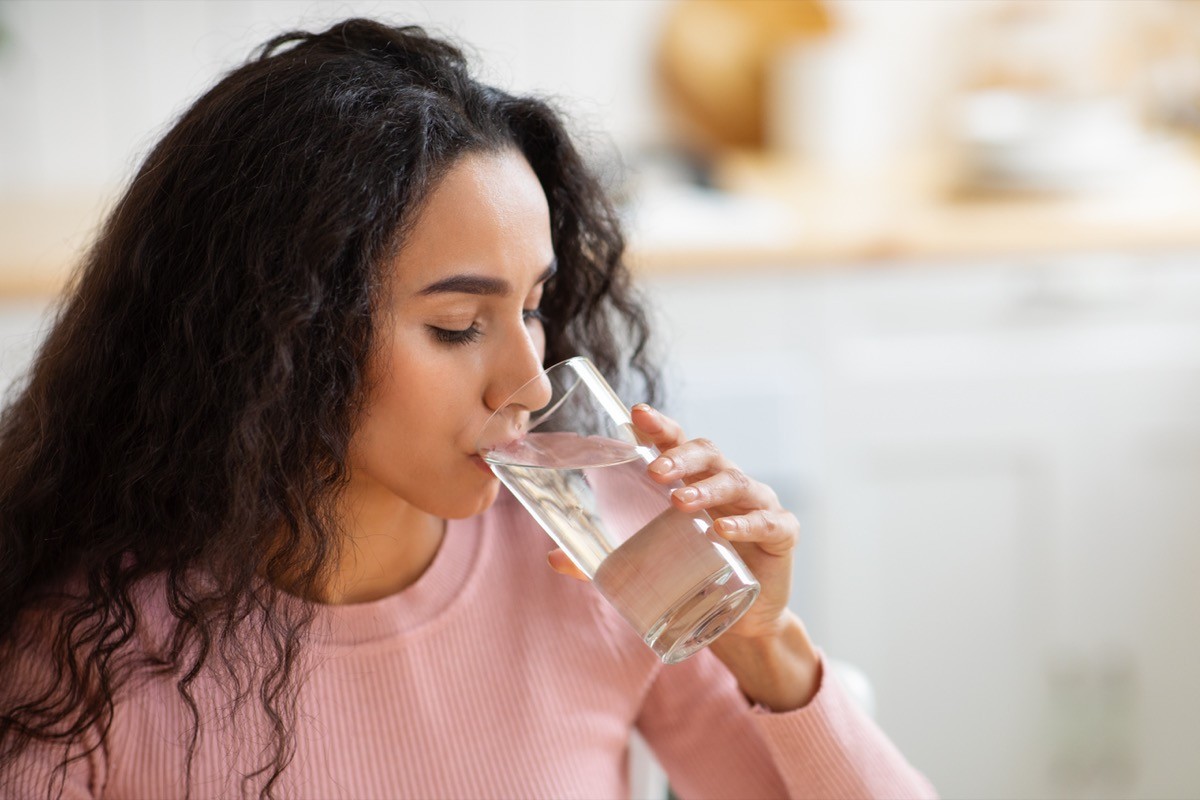
Dehydration can wreak havoc on your body in a myriad of ways, from fatigue and low mood to headaches and memory problems. It can also lead to weight gain.
As Johns Hopkins Medicine explains, drinking adequate water can naturally suppress your appetite, boost your metabolism, fuel your muscles to work out harder and burn more calories, and help with digestion.
When it comes to burning belly fat, though, you may want to reach for your water glass before meals.
According to a study published last year in the Journal of the American Medical Association (JAMA), overweight or obese adults who drank 6.3 cups of water per day before meals lost more weight than people who stuck to their regular water-drinking routine.
“Thirst, which is triggered by mild dehydration, is often mistaken for hunger by the brain,” explained Melina Jampolis, MD, an internist and board-certified physician nutrition specialist, in speaking with Johns Hopkins. “You may be able to decrease appetite by drinking water if you are, in fact, low in water not calories.”
2
And have a glass of lemon water when you wake up.
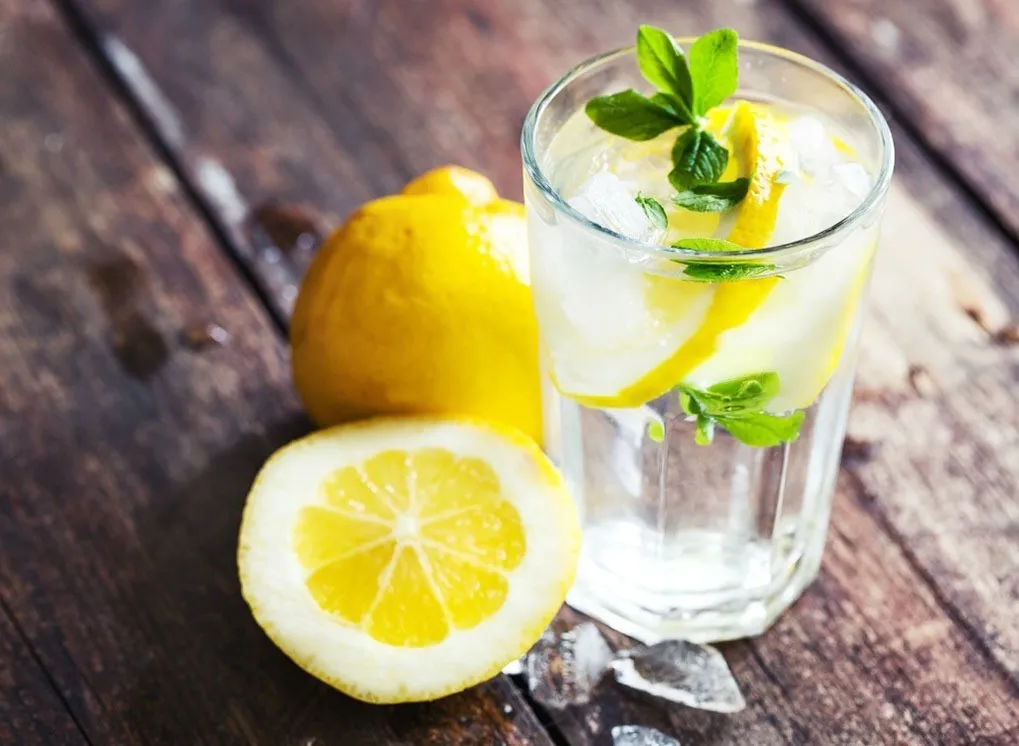
One lemon contains 30 to 40 mg of vitamin C, roughly half the recommended daily intake for women.
And according to a 2005 study published in the Journal of the American College of Nutrition, “Individuals with adequate vitamin C status oxidize 30% more fat during a moderate exercise bout than individuals with low vitamin C status; thus, vitamin C depleted individuals may be more resistant to fat mass loss.”
To get a double whammy of weight loss-boosting effects, add the juice of one lemon to a glass of water first thing in the morning.
“After hours of sleep, your body is dehydrated, and even mild dehydration can slow your metabolism,” Mario Padron, DO, founder and medical director of Focus ADHD Indy, previously told Best Life.
“Drinking water first thing helps kickstart digestion, wakes up your organs, and—here’s the key—can actually help regulate your appetite,” he added. “A lot of people mistake thirst for hunger, so starting the day hydrated helps prevent unnecessary snacking later.”
RELATED: Certain Foods Trigger Natural Ozempic-Like Weight Loss Effect, Doctor Says.
3
Walk at an incline.
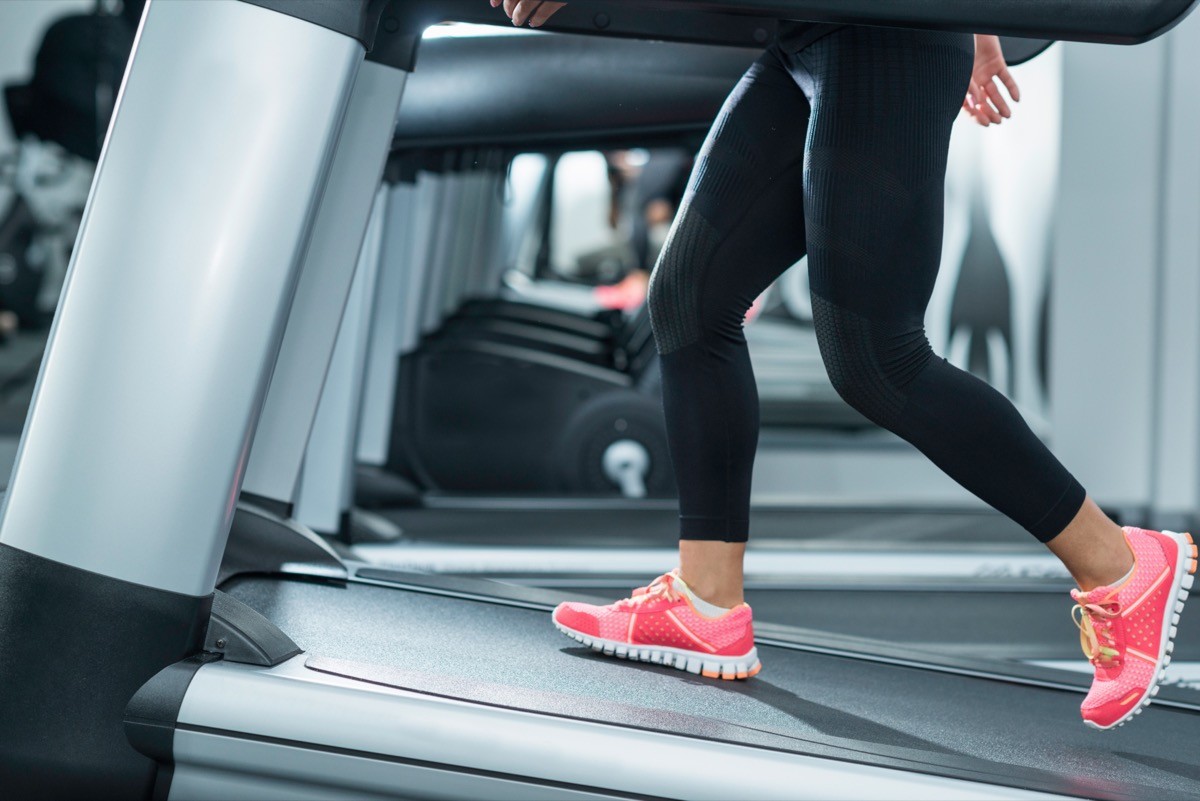
Walking on the treadmill at an incline is still a low-impact, accessible workout, but it can torch a lot more calories than a flat walk.
“The higher you set the incline, the more energy your body is forced to use to help activate your glutes, quadriceps, and calves, all of which have to put in overtime when the incline is increased,” certified personal trainer Chrys Crockett told NBC News. “This increase of energy burns more calories and, depending on your weight and cardiovascular endurance, can also burn more fat.”
A popular incline walking routine is the 12-3-30 workout, which consists of walking for 30 minutes at a pace of 3 miles per hour at an incline of 12.
“On average, the 12-3-30 workout can burn between 250-400 calories per session, depending on an individual’s weight and fitness level,” Josh Petrawski, a fitness expert and CEO at Sports and Fitness Exchange, explained to Best Life last year. “The incline increases calorie expenditure, which helps achieve goals related to weight control and fat loss.”
Even walking at an incline of 5 has been scientifically proven to increase caloric expenditure by about 52 percent.
4
Eat more soluble fiber.
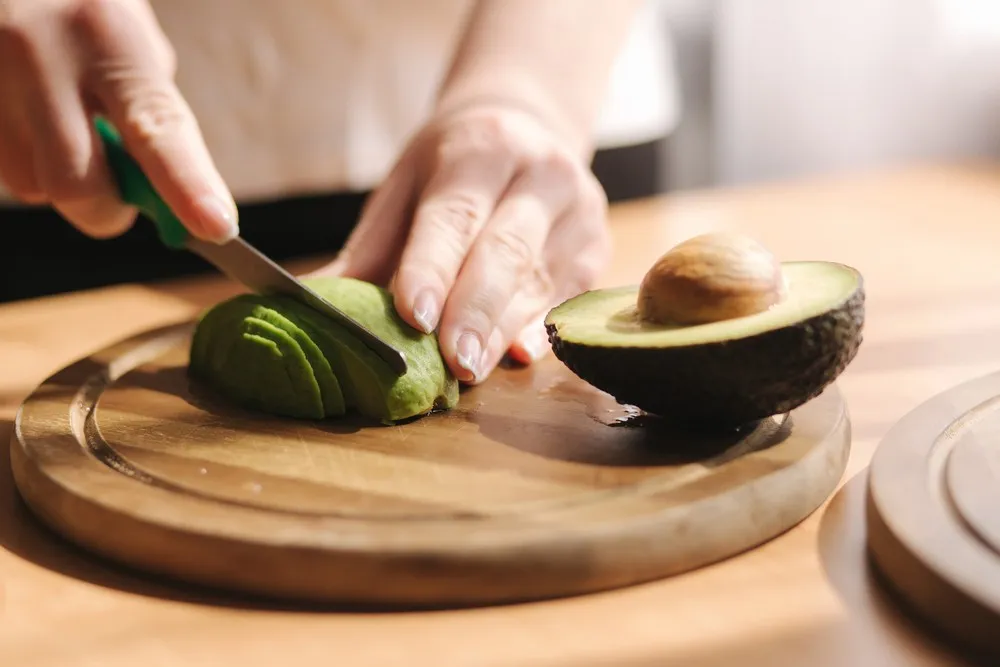
Consuming too little fiber can lead to weight gain.
“High-fiber foods tend to be more filling than low-fiber foods, so you’re likely to eat less and stay satisfied longer. And high-fiber foods tend to take longer to eat and to be less ‘energy dense,’ which means they have fewer calories for the same volume of food,” explains Mayo Clinic.
However, when it comes to losing belly fat, it may be best to focus on soluble fiber, which takes longer to digest (keeping you fuller), lowers cholesterol, keeps blood sugar levels stable, and improves gut health.
Mayo Clinic notes that some common sources of soluble fiber include oats, peas, beans, apples, bananas, avocados, citrus fruits, carrots, barley, and psyllium.
A 2011 study published in the journal Obesity concluded that eating more soluble fiber, along with moderate exercise, significantly reduced the accumulation of visceral fat—the unhealthiest type of belly fat that surrounds your organs.
Specifically, the researchers found that “for every 10-gram increase in soluble fiber eaten per day, visceral fat was reduced by 3.7 percent over five years,” according to a press release. This is the equivalent of eating two small apples, one cup of green peas, or a half cup of pinto beans.
RELATED: Eating These 12 Foods Can Burn Belly Fat Fast, Nutritionists Say.
5
Incorporate enough protein into your diet.
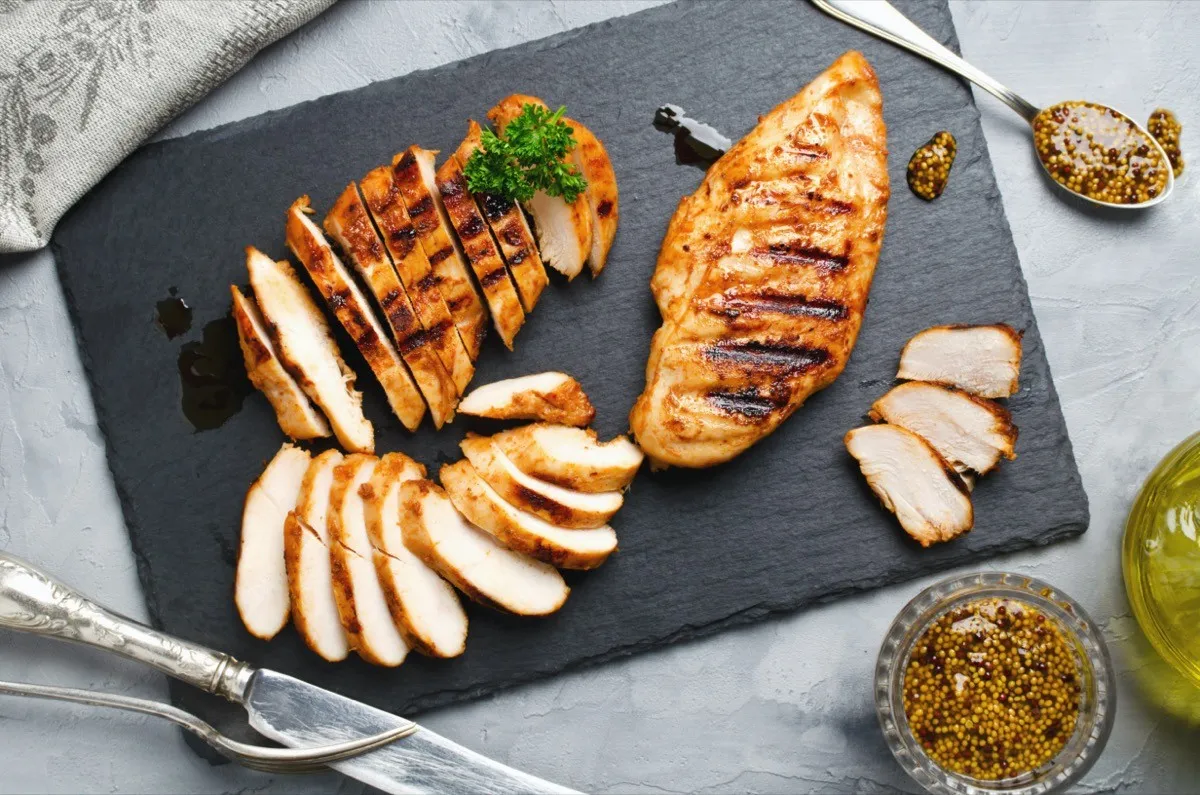
“Protein is critical for every cell in the body. It is a building block for muscle, hair, skin, and nails and helps build and repair tissue in the body,” explained Chris Mohr, PhD, RD, a fitness and nutrition advisor at Fortune Recommends Health, in a previous interview with Best Life about protein deficiency.
With that in mind, Cleveland Clinic notes that consuming adequate protein can help you lose weight by feeling fuller for longer, burning more calories than if you were eating carbs, and storing less body fat.
For belly fat specifically, though, they explain, “Increasing the amount of protein you eat can help reduce the buildup of harmful fats in your body, especially around your belly (abdomen). Protein is used to build muscle, so it can also help prevent muscle loss as you shed pounds.”
Cleveland Clinic recommends that between 10 and 35 percent of your daily calories come from protein; however, this can vary based on age, activity level, and your amount of lean muscle mass. You can use this calculator to determine your own requirements.
6
Take a deep breath.

Having someone tell you to “relax” is possibly one of the most counteractive pieces of advice out there. However, if stripping away belly fat is a goal, you may need to do just that since stress increases your body’s cortisol levels.
“Cortisol stimulates your fat and carbohydrate metabolism, creating a surge of energy in your body,” explained registered dietitian Gabrielle Mancella, RD, in an interview with Orlando Health. “While this process is essential for survival situations, it also increases your appetite. Additionally, elevated cortisol levels can cause cravings for sweet, fatty, and salty foods.”
She added that a spike in cortisol can also cause your body to produce less testosterone: “This may cause a decrease in muscle mass, as well as slow down how many calories your body burns.”
Plus, Mancella cautions that fat gained from increased cortisol levels typically accumulates in the belly.